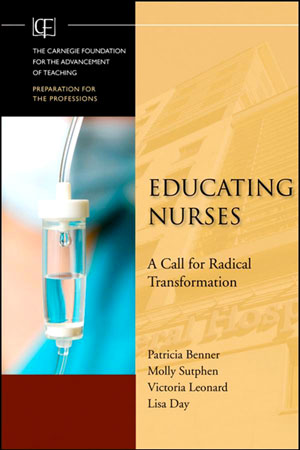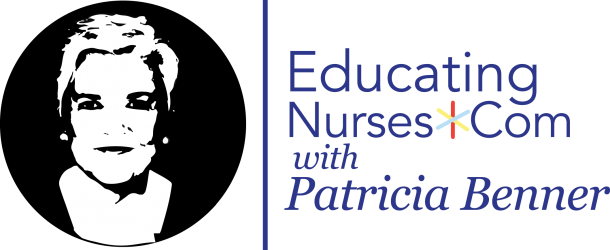
Educating Nurses: A Call for Radical Transformation
The Carnegie study of nursing education
culminates in the book, Educating Nurses: A Call for Radical Transformation, by Patricia Benner, Molly Sutphen, Victoria Leonard and Lisa Day. December, 2009 by Jossey-Bass.
Awards:
Journal of Nursing Education’s Top Teaching Tools—2012
American Journal of Nursing Book of the Year—2010
Prose Award for Scholarly Contribution —2010
Praise for Educating Nurses
Catherine L. Gilliss, DNSc, RN, FAAN
With this text, Patricia Benner and colleagues have reset the agenda for nursing education and it could not have come at a more critically important moment. Through careful discovery and thoughtful comparison, the authors have identified key areas for improvement in the structure and process of preparing the next generation of nurses for the deceptively complex work of caring for people and their families. It is a landmark publication.
Eloise Balasco Cathcart, coordinator, Graduate Program in Nursing Administration, New York University
This work has profound implications for nurse executives and frontline managers.
Christine A. Tanner, senior editor, Journal of Nursing Education
This book is a landmark work in professional education! It is a must-read for all practicing and aspiring nurse educators, administrators, policy makers, and, yes, nursing students.
Jodi Halpern, author, From Detached Concern to Empathy: Humanizing Medical Practice
The ideas about caregiving developed here make a profoundly philosophical and intellectually innovative contribution to medicine as well as all healing professions, and to anyone concerned with ethics. This groundbreaking work is both paradigm shifting and delightful to read.
David C. Leach, former executive director, Accreditation Council for Graduate Medical Education
This book describes specific steps that will enable a new system to improve both nursing formation and patient care. It provides a timely and essential element to health care reform.
Beverly Malone, chief executive officer, National League for Nursing
This book represents a call to arms, a call for nursing educators and programs to step up in our preparation of nurses. This book will incite controversy, wonderful debate, and dialogue among nurses and others. It is a must-read for every nurse educator and for every nurse that yearns for nursing to acknowledge and reach for the real difference that nursing can make in safety and quality in health care.
Helene Fuld Health Trust Professor of NursingDean, Duke University School of NursingVice Chancellor for Nursing Affairs, Duke MedicineEducating Nurses:
Educating Nurses A Call for Radical Transformation is part of a multiyear comparative study of professional education in the United States called the Preparation for the Professions Program (PPP) at The Carnegie Foundation for the Advancement of Teaching. Conceived of as a way to understand how professionals are prepared to practice, PPP examines common themes and identifies practices distinct to various forms of professional education.
Over the last decade, PPP has conducted national studies on the education of clergy, lawyers, engineers, physicians and nurses. The project was funded by Carnegie and The Atlantic Philanthropies. These highlights are based on the Carnegie/Jossey-Bass publication of the same title, Educating Nurses: A Call for Radical Transformation (December 2009). To order, visit the Jossey-Bass website.
Introduction
The profession of nursing in the United States is at a significant moment. It must contend with enormous pressures, from the chaotic health care system and the economic forces that drive it to profound changes in science, technology and patient activism. These demands, combined with ongoing shortages in the ranks of nurses and shifts in the nature and settings of nursing practice, have an impact on the profession’s ability to uphold and transmit its core values: to provide astute clinical judgment, to keep patients safe, and to ameliorate human suffering.
It is in this environment that The Carnegie Foundation for the Advancement of Teaching releases the results of the first national nursing education study in over 30 years. Educating Nurses: A Call for Radical Transformation explores the strengths and weaknesses in nursing education and the external challenges the profession faces. It identifies the most effective practices for teaching nursing and persuasively argues that nursing education must be remade. Indeed, the authors call for radical advances in the pathways to nursing licensure and a radical new understanding of the curriculum.
Based on extensive field research conducted at a wide variety of nursing schools, and a national survey of teachers and students administered in cooperation with the National League for Nursing (NLN), the American Association of Colleges of Nursing (AACN) and the National Student Nurses’ Association (NSNA), Educating Nurses offers recommendations to realign and transform nursing education. Educating Nurses is the fourth volume in a series of comparative studies by the Carnegie Foundation that examines how the members of different professions are educated for their responsibilities in the communities they serve.
The Study
The Carnegie National Nursing Education Study examined three dimensions of nursing education and formation: 1) the learning of theory and scientific methods; 2) the mastery of skillful practice; and 3) the formation of professional identity and agency. These “three apprenticeships” are integrated in the identity and actions of the professional nurse; thus, the research team explored the relationship among the apprenticeships throughout the study’s two stages.
To complement the site visits, the second phase of research included a national survey of faculty and students, conducted in collaboration with the American Association of Critical Care Nurses (AACN), National League of Nursing (NLN) and National Student Nurses’ Association (NSNA)—leading nursing organizations. The findings from these surveys were incorporated into the report, along with student and faculty comments.
The survey instruments can be viewed at: www.carnegiefoundation.org/nursing-education/surveys
Publisher: San Francisco: Jossey-Bass and Carnegie Foundation for the Advancement of Teaching. Palo Alto: Stanford UniversityPublication
Authors: Patricia Benner, Molly Sutphen, Victoria Leonard and Lisa Day
Abstract
Educating Nurses: A Call for Radical Transformation explores the strengths and weaknesses in nursing education and the external challenges the profession faces. It identifies the most effective practices for teaching nursing and persuasively argues that nursing education must be remade. Indeed, the authors call for radical advances in the pathways to nursing licensure and a radical new understanding of the curriculum.
